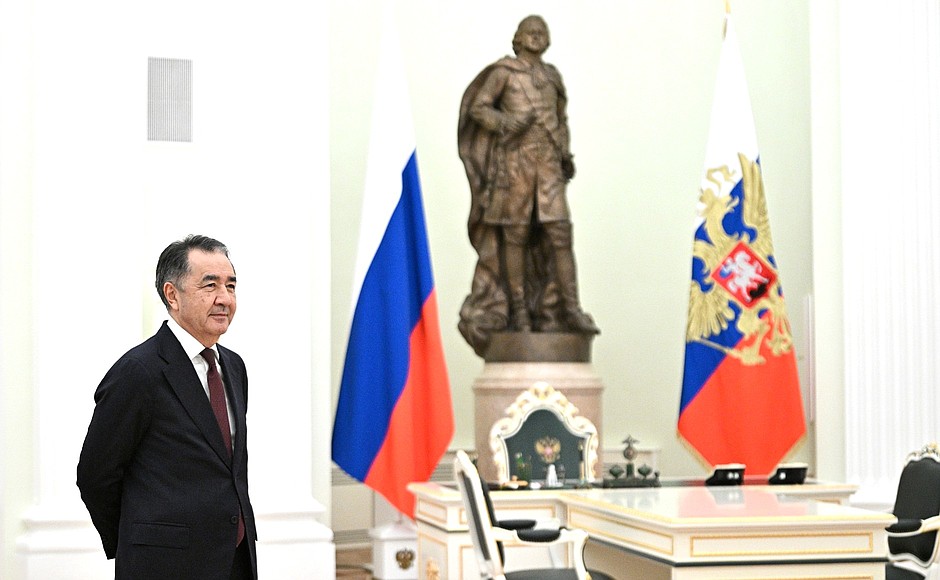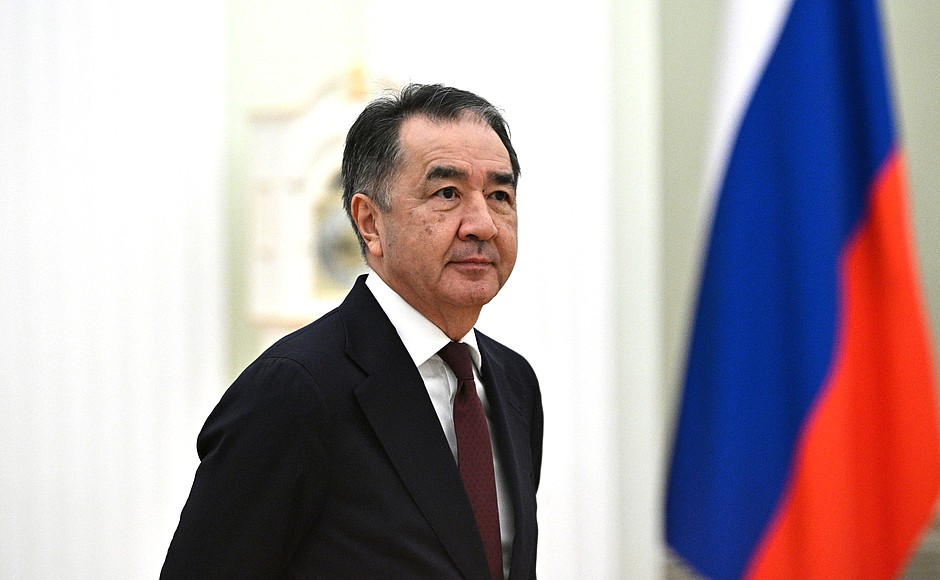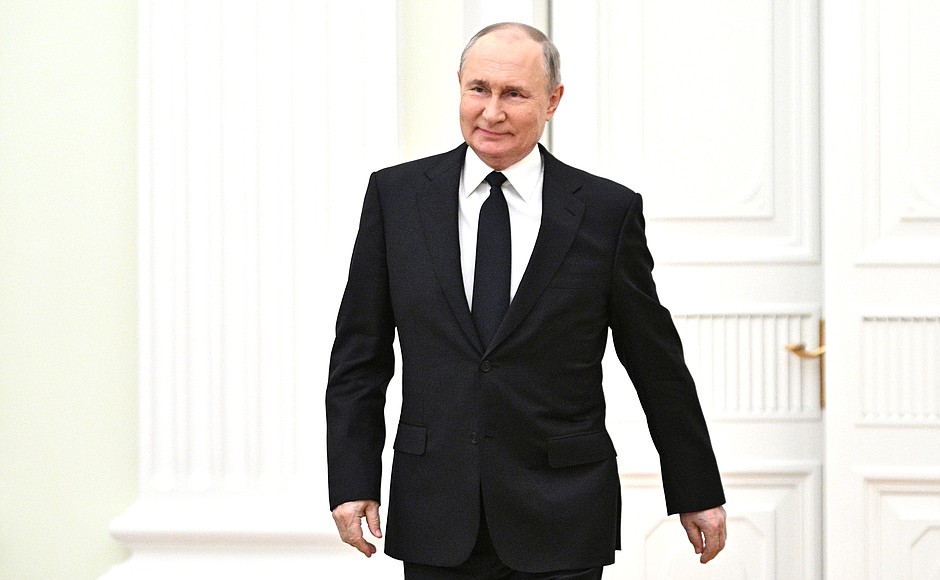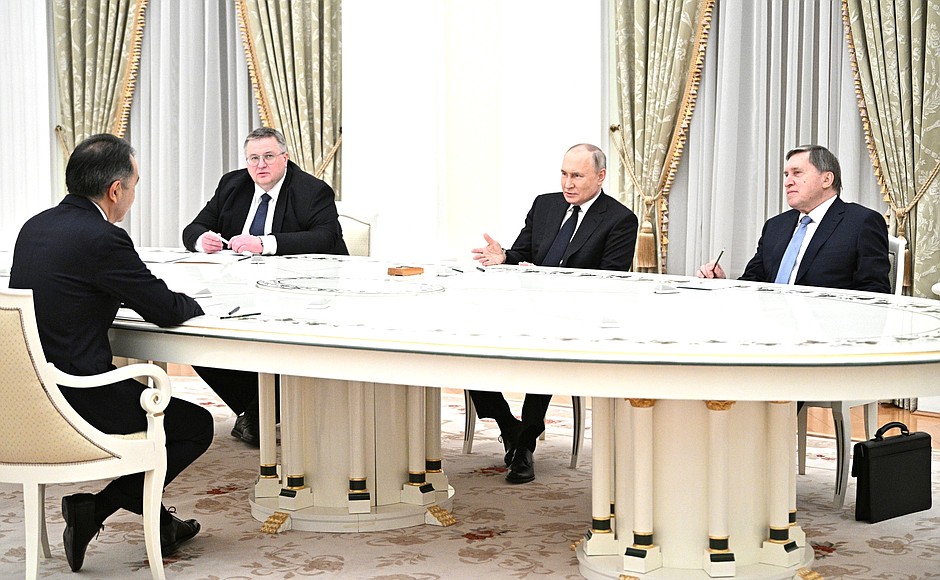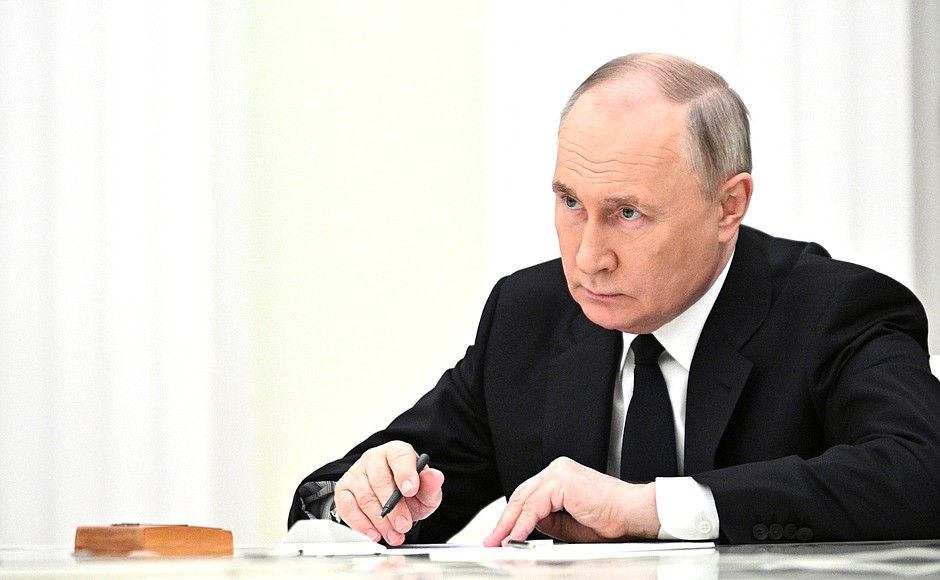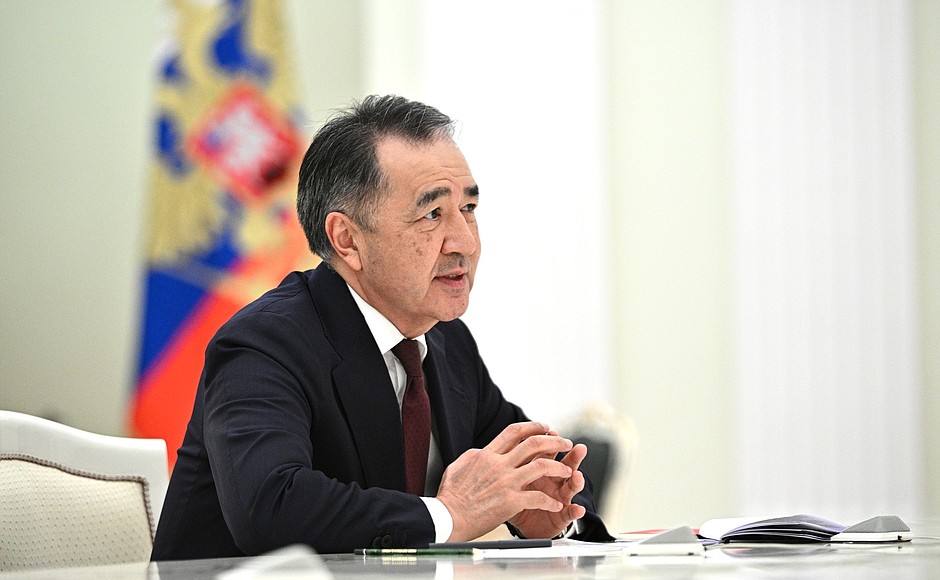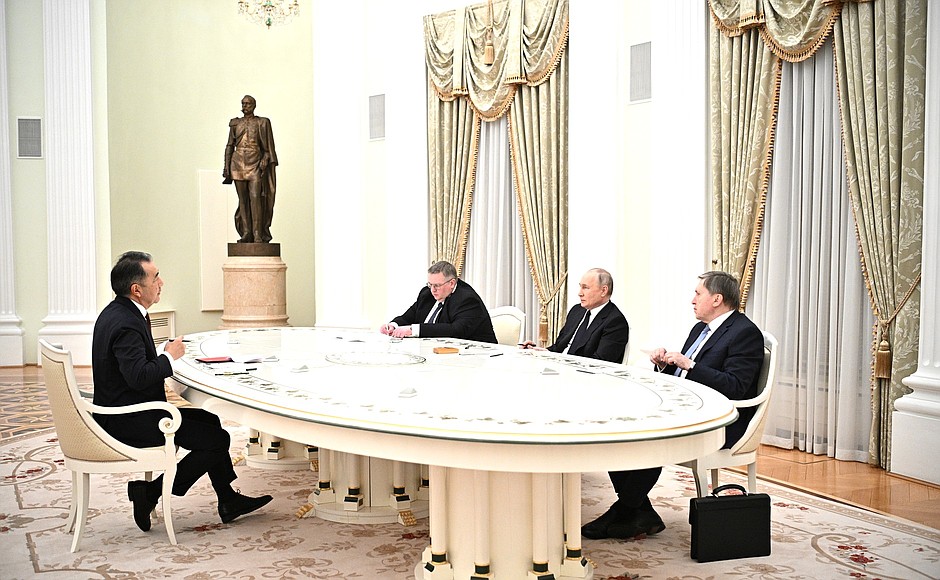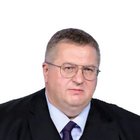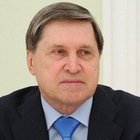Deputy Prime Minister Alexei Overchuk and Presidential Aide Yury Ushakov also attended the meeting.
* * *
President of Russia Vladimir Putin: Mr Sagintayev, I am delighted to see you.
I would like to congratulate you again on assuming office, which you have done without any delay, getting to work as of February 1. You have already held the first commission meetings. I believe it was in Almaty, wasn’t it?
Chairman of the Board of the Eurasian Economic Commission Bakytzhan Sagintayev: Yes, we held a meeting of the Eurasian Intergovernmental Council in Almaty.
Vladimir Putin: There is a great deal to do, but you have extensive experience. You have held top positions in the executive government of Kazakhstan, including as deputy prime minister and prime minister, so you have a lot of experience.
In fact, work at the Commission is nothing new to you because you have worked there for several years as deputy chairman.
The Commission is being renewed now.
Bakytzhan Sagintayev: Yes, we have new objectives.
Vladimir Putin: We have new objectives because we face many challenges, and their number is growing.
Bakytzhan Sagintayev: Absolutely.
Vladimir Putin: Nevertheless, your work is very interesting and can benefit our countries’ economies.
I know that you have started preparations for an anniversary event, which has been scheduled for May 8. Will we hold it here in Moscow?
Bakytzhan Sagintayev: Yes, it will be held in Moscow.
Vladimir Putin: Wonderful. We are always ready for such events. As you know, we are pleased to do this. All our colleagues will find a warm welcome here.
I believe you have worked with all the heads of state. Everybody seems to know you. But now, you are introducing yourself to our countries’ leaders in a new role.
I wish you every success. We will do all we can to support you.
Bakytzhan Sagintayev: Thank you very much.
Mr President, thank you for today’s meeting and congratulations on your landslide victory in the Russian presidential election.
Vladimir Putin: Thank you.
Bakytzhan Sagintayev: The election results indicate that the nation fully supports your policy and that you have chosen the correct strategic course of socioeconomic development. I wish you and the Russian people prosperity, dynamic development across all sectors, and success in overcoming all challenges.
The fact that we are meeting immediately after the election shows how much you care about integration and the EAEU, in particular. On behalf of the entire Eurasian Economic Commission and all my colleagues, I would like to thank you once again for this meeting.
You know very well that this year marks ten years of our integration since the signing of the treaty in 2015. As you noted today, I was involved in drafting the treaties as an expert and I know how thoroughly you discussed every article. The fact that the union operates and prospers today is the result of the work done by you and your colleagues in the early days.
If we look at the numbers, mutual trade between our countries has almost doubled in the past decade, thanks to integration. Foreign trade has grown by 60 percent. As concerns settling accounts with each other in national currencies, during the period from 2015 and 2021, payments in national currencies accounted for over 70 percent. In 2022, we reached 80 percent. In 2023, it was already 90 percent. I believe that at this pace, we will complete this transition to payments in national currencies very soon. We are delighted to see this great development.
If we look at the 2023 results, they are impressive. But in general, if we look at specific industries, retail trade grew by 6.6 percent, investment capital by 10 percent, and industrial production is growing at a rate of almost 4 percent. Importantly, the amount of construction works has grown by more than 8 percent. So, the governments of our countries are dealing quite well with the tasks set by the heads of state.
I have mentioned that this year, the EAEU marks ten years since its establishment, and there are several key decisions to be made in 2025. These include creating a common market for energy, oil, gas and electric power. Another very serious issue is our common financial market.
As you know, according to the treaty, there must be an office in Almaty. Our central banks and national banks are working hard to make it happen. I think that by the end of the year, we will reach a decision on the format of our further work in this area.
Of course, one of our priorities is the Eurasian Economic Path Declaration, which has largely defined our efforts since it was signed by the heads of state in late 2023 in St Petersburg. It outlines our medium-term and long-term strategies until 2045. You were the one who initiated this declaration. The heads of state supported this document and adopted it. Today, we are working on an action plan together with the national governments. We hope to be able to complete these efforts by the end of 2024 so that by that time the Supreme Council can approve it. This way, we can get down to carrying out the provisions set forth in this declaration from next year, just as the first strategy runs its course.
There is one more topic the heads of state keep bringing up at every Supreme Council meeting. Today, it is also a priority for us. I am talking about introducing digital technology and solutions in our economies. This is a major task for us. Of course, we do understand that the level of digital transformation varies from one country to another within the EAEU, which does hinder our efforts, even if slightly, since when one country decides to move forward, we are unable to connect another country to the same process…
Vladimir Putin: Not ready.
Bakytzhan Sagintayev: Still, we are working along these lines, and our banking community and central banks are doing a great job. The Russian Central Bank launched the digital ruble, and the National Bank of Kazakhstan has already launched the digital tenge. We are making plans for a switch to digital money, considering the geopolitical environment.
We have even had discussions with our colleagues on carrying out settlements for certain kinds of products in digital currency. This is work in progress, and we discussed it during the meeting of prime ministers in Almaty. Prior to that there was a digital forum where we promised to present our near-term vision for the digital agenda to prime ministers, so that we can move on and seek the approval from the heads of state.
We have been investing a lot of effort on this front, since we live in the digital age when our people, businesses and society want us to rely on digital solutions when dealing with the four freedoms.
There are some outstanding questions though. Take our tax systems or other structures: how will they exchange information, how do they transfer data among themselves, protect it, etc.? We need answers. Just two weeks ago, I had a meeting with German Gref, whom I’ve known for a long time. I called him on the phone and went to see him, asking for his assistance, in view of all the great work they have accomplished over at Sber. We agreed that they would offer us their advice and have their specialists assist us in our efforts. After all, the specialists we have in our staff are bureaucrats rather than IT professionals, considering the salaries they earn.
You also raised the issue of industrial cooperation and supported this sector last year by allocating budget funding to this effect. We are now receiving many proposals with many banks involved across all five countries.
Today, we also asked the Eurasian Development Bank (EDB) to join these efforts. I invited the head of the EDB and we sat down to discuss the projects we already have, taking into account the EDB’s experience, so that we could get down to considering them.
As of today, we are examining four projects: two from Gazprombank, one from the Halyk Bank, and another from EDB. But this process has not been without its challenges and we would like to outline these at the June Council of Heads of Government. In fact, there is too much red tape and many administrative barriers, and all the criteria have a cooling effect. This is why businesses are reluctant to become involved despite the attractive subsidies we offer them. Our colleagues will have a meeting with Mr Manturov soon to discuss these issues, among other things.
In early February, soon after I was appointed, I met with Prime Minister Mishustin. Mr Overchuk also attended this meeting, and the three of us talked it all over, agreeing to hands-on efforts to launch and publicise several industrial cooperation projects. This was designed to show how they could be useful and beneficial, and that our Union makes these projects possible. We must support projects of this kind across our Union.
Vladimir Putin: Mr Sagintayev, I wanted to ask you something. In 2024, Russia assumes the BRICS chairmanship. Other EAEU countries are not part of this association, but it offers ample opportunities. I am referring to the plans of our Chinese friends, the Belt and Road Initiative. We keep saying that these projects can be complementary: our vision for Eurasian development and the Chinese initiative. The BRICS leaders will come to Kazan, so I would like to ask you to explore and discuss with your Russian colleagues how EAEU countries can work together with BRICS countries. There could be so many interesting projects and development opportunities here.
You talked about financial transactions. There are also things we can discuss on this topic. Many of us are interested in devising a system for carrying out settlements in national currencies that can operate as a standalone, modern, innovative and high-technology settlement centre serving many countries. This can be done, and caries a lot of promise, just as with financial and banking systems.
As you know, we created the New Development Bank within BRICS, and it also has all kinds of ideas on expanding its work and playing a bigger functional role. It would be great if Russia could put forward several proposals which would serve all our member states. After all, we seek to coordinate all the steps we take with all the EAEU members which, of course, includes your position and the Commission’s positon. Together, we could draft a joint proposal.
This would serve everyone’s interests. All countries, be it Russia, Kazakhstan or Belarus, work with BRICS countries in one way or another. It would be great if we could put forward certain proposals and submit them to our colleagues, as we will discuss right now. I have certain ideas. If we present them as our joint initiatives, this could well become a recipe for success.
Bakytzhan Sagintayev: Mr Putin, we will work on these matters.
<…>
